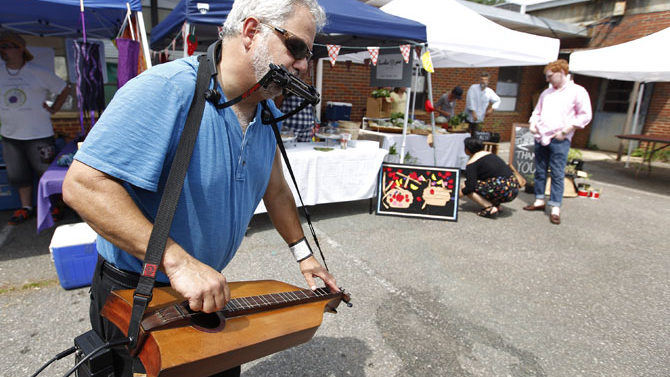The neighborhood surrounding the old West Broad School is “pretty much the best location in town,” with schools, a Kroger, the library and St. Mary’s all within walking distance, according to Heather Benham, the executive director of the Athens Land Trust, which has developed about 20 affordable houses in the area.
It has a lot going for it, and the land trust’s community garden and farmers market on the school grounds, like The Dude’s rug, really ties it all together. Residents have plenty of ideas for how the neighborhood can be revitalized further. But with home prices skyrocketing in Normaltown and college kids crowding into the Hancock Corridor north of Broad, south of Broad the Hancock Corridor and Rocksprings are the next intown neighborhoods marked for gentrification, according to Athens-Clarke County Commissioner Melissa Link.
“The challenge is implementing what they want to see without displacing them from what is so valuable,” Benham said at a Federation of Neighborhoods meeting last week.
With the West Broad Market Garden in the news lately, the meeting drew a standing-room-only crowd of more than 100 to Ciné’s lab on June 6. They heard from a panel that included Benham; Alvin Sheats, executive director of the nonprofit Hancock Community Development Corp.; Link and Clarke County Board of Education member Linda Davis, both of whom represent the neighborhood; market vendor Willa Fambrough; and Athens Housing Authority Executive Director Rick Parker.
In 2013 the land trust conducted a charrette with neighborhood residents that recommended, among other things, traffic calming on Evans Street (a cut-through between Baxter and Broad), a pedestrian pathway through the St. Mary’s property (which blocks the shortest route to Kroger) and doing something with the vacant Art Deco building that once housed a Masonic lodge. Now, the alphabet soup gang—AHA, ALT, ACC and CCSD—are collaborating with the Warren Buffett-funded anti-poverty nonprofit Purpose Built Communities on a “feasibility study” for the West Broad neighborhood. As Benham explained, rather than do a traditional master plan and frustrate people when funding can’t be found, the feasibility study will identify resources first, and then the community can decide what’s done with them. “You just hate to get up expectations and then fail,” Benham said.
Already some measures are in place. The Young Urban Farmers initiative pays 14–17-year-olds to start their own businesses, ranging from photography to tie-dyed T-shirts to birdhouses, Fambrough said. CCSD has pulled funding for the program in its upcoming budget, but the ALT is soliciting donations to keep it going. The corridor is also an Opportunity Zone, which means employers are eligible for tax breaks, Link said.
In agreeing to jointly fund the $15,000 feasibility study, the four aforementioned entities are flexing to clear what Parker identified as the tallest hurdle standing in the way of change: “Trying to partner together.” Nobody, not even the federal government, has the money to do big, transformative projects anymore. As an example, Parker cited the Boys & Girls Club in the H.T. Edwards building, which saved the gym of the historic black school and is the result of cooperation among CCSD, ACC and the AHA. “None of those organizations could have done it on their own,” he said.
Like H.T. Edwards, the West Broad School is a relic of the segregation era, but also a point of pride for the African American community. Davis (who is black) called it an icon. “This is our last chance to save a part of our history,” she said. The school district is poised in coming years to renovate it for central offices—a project that could force the removal of the community garden. While the feasibility study is separate from the renovation project, it could guide district officials if they are at all interested in saving the garden (which, at this point, remains an open question). The farmers market isn’t the utopia of diversity that people portray it as, Davis contended. “Athens is still a very segregated community,” she said. “I go to the market, and the white people talk to the white people, and the black people talk to the black people.”
But back to the study. “I’m not sure what’s going to come out of it,” Benham said. But Link has a wish list: loosening zoning regulations to allow smaller houses on smaller lots, and an inclusionary zoning policy and density bonuses to mandate or at least encourage affordable housing. Another possibility is redeveloping the Broadacres and Rocksprings public housing complexes, as the AHA and private developer Columbia Residential are doing with Jack R. Wells (aka Pauldoe) off Hawthorne Avenue. Davis said she’s a fan of Columbia Brookside, but doing something similar in West Broad would erase a connection to the past. “We’re not going to do anything in Broadacres or Rocksprings without our customers being fully in support and engaged in the process,” Parker said.
Like what you just read? Support Flagpole by making a donation today. Every dollar you give helps fund our ongoing mission to provide Athens with quality, independent journalism.










